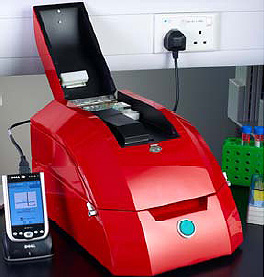Nov 4 2011
The Institute of Bioengineering and Nanotechnology (IBN), is pleased to announce that its disease diagnostics technology, the MicroKit, has won the Silver Award at the Asian Innovation Awards 2011 organized by The Wall Street Journal Asia.
The result was announced yesterday evening at the awards ceremony held at the Four Seasons Hotel in Hong Kong, which was officiated by Sir John Major, former Prime Minister of the United Kingdom.
 Designed to enable diagnosis outside the laboratory, the MicroKit is portable
and easy to use for non-clinical personnel.
Designed to enable diagnosis outside the laboratory, the MicroKit is portable
and easy to use for non-clinical personnel.
The Asian Innovation Awards recognize innovations that break with conventional processes in creative ways. Developed in Singapore by IBN Executive Director, Professor Jackie Y. Ying and her team members, Guolin Xu and James Tseng-Ming Hsieh, the MicroKit is an automated diagnostic device that can detect viruses rapidly and accurately within two hours. Current efforts to contain infectious diseases are often hampered by the time it takes to diagnose and isolate those carrying the virus. Conventional diagnostic tests can take up to half a day and can only be conducted in dedicated biosafety laboratories by clinical personnel, who might risk accidental exposure to the virus.
Designed to enable diagnosis outside the laboratory, the MicroKit is portable and easy to use for non-clinical personnel. The MicroKit simplifies disease detection by integrating the sample preparation, amplification and detection processes in a disposable polymer cartridge. As everything takes place within the completely sealed cartridge, the risk of potential virus exposure is minimized. This portable device can be used at airports, borders, checkpoints and clinics to help contain the rapid spread of infectious diseases and prevent pandemics.
"We are delighted to receive the Silver award for the MicroKit. Our device aims to diagnose infectious diseases safely and quickly. Such diagnostic kits really help towards curbing the spread of diseases such as H1N1. This invention is the result of multidisciplinary research and reflects IBN's mission to develop innovative biomedical devices that will improve healthcare and benefit society," said Professor Jackie Y. Ying.
Now in its 12th year, The Wall Street Journal's Asian Innovation Awards attracted 256 entries from 18 countries and territories in the Asia Pacific region this year. The Asian Innovation Awards is committed to finding the next big technological ideas in Asia. This year's entries have been shortlisted based on three criteria: level of creativity or degree of innovation, quality of execution, and potential impact on quality of life or productivity. The awards were open to individuals, small businesses, large corporations or academia in Asia Pacific. IBN's MicroKit was one of the 12 finalists selected, and one of 5 finalists from Singapore. Please refer to the Annex for information on the judging panel for the awards.
IBN licensed the MicroKit technology to SG Molecular Diagnostics Pte Ltd in January 2009 to develop a range of diagnostic devices. The Institute is also working on the nextgeneration MicroKit, which will process 20 samples for 25 different diseases simultaneously.